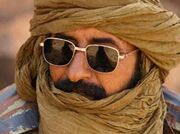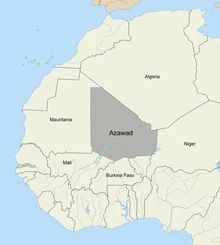| |||||||
| Capital | Gao | ||||||
| Largest city | Timbuktu | ||||||
| Other cities | Kidal, Taoudenni | ||||||
| Language official |
Arabic | ||||||
| others | Tuareg Berber, French, English | ||||||
| President | Ibrahim Bahanga | ||||||
| Vice President | Moussa Acharatoumane | ||||||
| Population | 7,000,000 | ||||||
| Independence | February 19, 2001 | ||||||
| Currency | Azawad Shilling | ||||||
Azawad is a Republic in the Malian Azawad region. It is considered by other Saharan states to be the true successor state to Mali, but is frequently looked down upon by the CSS for having supposed fradulent elections.
History[]
Pre-Y2K[]
Tuaregs in the Azawad region have wanted independence for many years before Y2K, evident from the Tuareg Rebellions. Timbuktu, one of Mali's largest cities, was located in the proclaimed Azawad region, making military operations to capture it extremely difficult.
Y2K[]
With a recorded 5 kiloton nuclear strike on Bamako and a 1 kiloton strike on Timbuktu, Azawad rebels were able to capture many cities without intervention from the rapidly collapsing Mali government. Timbuktu fell without incident on January 7, 2001.
Post-Y2K[]
Establishment of Azawad[]

The fading mushroom cloud over Bamako.
The leader of the newly formed Rebel forces, the MNLA, was lead by Ibrahim Bahanga. Ibrahim had considered forming the MNLA at a later time when more forces would be recruited, he didn't hesitate to create the organization when he found out about the destruction of Bamako and the death of President Konaré. While his fighters were out capturing rural cities, Ibrahim met with fellow rebel leaders, Moussa Acharatoumane, and Bilal Cherif, to write the new constitution for the nation-state of Azawad.

1st and Incumbent President of Azawad, Ibrahim Bahanga.
After a long five-day argument, part of which was audio recorded for reference purposes, Bilal Cherif backed down on his idea for an Islamic Republic, and went with Ibrahim's plan for an non religiously-affiliated republic. The Republic of Azawad was proclaimed over a radio address on February 19, 2001. The interim government was made up of Interim President Ibrahim Bahanga, Interim Vice President Moussa Acharatoumane, and Interim Secretary of State Bilal Cherif, all of the newly created Azawad Nationalist Party.
Azawad Civil War[]

Members of the Timbuktu Street Patrol.
Early on in Azawad's existence on November 27 2001, Islamic fundamentalists took up arms against the government, calling for the Islamic Republic of Azawad, a republic Bilal Cherif promised before his idea was rejected. For sixteen days, a war ravaged the streets of Timbuktu. Over 3,000 people were killed before President Bahanga negotiated a ceasefire. A change in constitution promised special protection of the Qur'an and gave a tax break for Muslims to last until January 2003. To prevent another outbreak of street fighting, President Bahanga created the Timbuktu Street Patrol, currently the largest city police force in Africa with 1052 active members.
State Media Created[]

The logo for Azawad National News, on 1170 AM.

A cast member from Azawad's #1 Radio Drama, "Gao City Days" on 1170 AM.
During the government's effort to regain contact with other survivor nations in Late 2002, President Bahanga created the Azawad State Media. This media only comprised of a single AM Radio Station stretched by the thinnest of lines to reach all of Azawad. These radio towers were made of crude materials, and were prone to problems. The radio dial setting was 1170 AM. Even so, the interim three-man government managed to provide addresses to the nation following the short civil war. During the 2006 Election and the establishment of the multi-party democratic system, the state media was used by Bahanga to assist in his re-election campaign. After the election, the Azawad National News was created to serve the nation, along with the late night radio drama, "Gao City Days", which quickly became one of the most popular radio dramas in history.
2006 Presidential Election[]
Due to the constitution guaranteeing a maximum of 3 five-year terms, An election five years after the creation of the Interim presidency took place. Due to the transition to a multi-party system to prepare for the election, the new second major party became the Liberal Party, with the presidential nomination being former MNLA military officer, Manden Ahg. The major third party, the Islamic party, had nominated Bilal Cherif, who had transfered parties during his Interim Secretary of Statehood. During the tense primaries in the 3 provinces, 11 of the 15 delegates (5 delegates per province) went to Ibrahim Bahanga. 3 of the delegates went to Manden Ahg, and 1 of the delegates went for Bilal Cherif.
Due to Bilal's betrayal of the Nationalist Party and his utter failure in the election, the first order of business in Ibrahim's second term was to force Bilal to resign. Islamic fundamentalists in Azawad, still angry about the results of the civil war, were furious about this decision. Protests that would've surely turned into a second civil war, were quickly dispersed by the Street Patrol. Manden Ahg was quickly appointed the new Secretary of State.
2007 Malian Annexation Attempt[]
In April of 2007, a new state in what used to be Southern Mali erupted out of thin air. Calling itself "Mali" once again, this successor state built a military alliance with the remaining militaries of the survivor states of Liberia, Ghana, and Benin This pact was made to aid Mali's attempt at annexing Azawad and restoring Mali to its former glory.
Once ground troops moved into Timbuktu, Street Patrol was very quick to utterly decimate Malian forces. 732 deaths of Malian troops were recorded by Azawad government officials visiting the city after the battle.
The Liberian Air Force were brought down a few miles west of Gao, due to the amount of planes going to the capital city was only 3. The Air Force of Benin, with one airplane deployed, was also shot down over Kidal by Islamic Fundamentalists using arms from the 2001 Civil War. The Ghanaian Air Force made advances into Gao, but six of the seven airplanes deployed crashed due to mechanical problems, with one of the airplanes crashing into a mosque and exploding following mortar fire from below.
A peace treaty with Mali was created in October 2007, but it didn't last long as the new Malian government collapsed in 2011. Currently, there is no government, official or self-declared, that represents the original Pre-Y2K Mali.
2011 Presidential Election[]
The 2011 Azawad Presidential Election was closely monitored by international bodies, as the protests of election fraud by the Azawadian Islamic Fundamentalists were considered testimonials. The Islamic Party, again, nominated Bilal Cherif. The Liberal Party also nominated Manden Ahg. Due to rising anti-Islamic Fundamentalist sentiment in the country, 0 of the delegates went to Bilal Cherif. Liberalism in the country had been on the rise in the country, with 7 of the delegates went to Manden, and 8 of them going to Ibrahim.
Disgraced, Bilal declared he was going to Libya for "medical treatment" after he had suspected cancer tumors. To this day, Bilal has not been seen by Libya or Azawad, and is presumed to be in hiding.
Collapse of the Islamic Party[]
In July of 2011, 5 months after the 2010 election, the Board of the Islamic Party of Azawad met to discuss growing member leave. At the end of this historic meeting, the Board decided to formerly dissolve the Islamic Party, due to high member leave from the party and the lack of nomination for the upcoming 2016 election.
This stunning decision paved the way for the fourth largest party, the Marxist-Leninist Party, to become a new Major Party. Currently, there is no project nomination for the 2016 election, but decisions are in motion to nominate someone who is a former MNLA member.
Government[]
Azawad is a fairly stable multi party democracy, but has been accused by international organizations of election fraud, due to Ibrahim Bahanga winning three terms consecutively, with the first two by wide margins. The current three major parties, are the Nationalist Party, the Liberal Party, and the Marxist-Leninist Party (commonly called the Communist Party). Before 2010, the third major party was the Islamic Party.
Currently, the constitution allows for three consecutive five-year terms, and one more non-consecutive five-year term. The Vice President and the Secretary of State are appointed by the President upon Election. The government currently has no parliament or congress of any kind, and situations are solved solely by the President, Vice President, and Secretary of State. Opinions however, are sent in by the people to this trio and are taken into account when doing a vote.
Religion[]
Islam is prevalent in the region, with Christianity and Deism making up less than 3 percent of the population. Islam is to stay out of governmental decisions according to the constitution, but due to the Civil War's effects, the tax break and the special treatment of the Qur'an was an exception. A new amendment is being considered to allow for Islam in government during national stability-threatening situations such as civil war.
Military[]
Army[]
Currently, Azawad's army is made up of the Street Patrol and remnants of the old Malian army. The official total as of 2010 was 1,3918. Recently, five hundred MP5s and three hundred AK-47's were imported to Azawad from the Military Junta nation of Macau, as part of their military alliance. There are plans to export two leftover tanks from the Malian Annexation Attempt to Macau, as part of the deal.
Air Force[]
Azawad has only two flying airplanes, both of which are F15s imported from Libya.
Media[]
Media is completely state regulated in Azawad. The AM Radio Station, set at 1170 AM, shows the Azawad National News, Gao City Days, and reruns of the Lone Ranger. The one current official newspaper, The Azawad National is state-run. Almost all of its news stories include some kind of reference to the ruling Nationalist Party, and frequently the headlines related to President Bahanga. All stories are required to be in favor of the right-wing, according to the contract signed when joining the newspaper's writing team. Currently, a film studio is in the works, but it is suspected to only be for propaganda purposes.
Travel[]
Travel is mainly by camel, as there is no main road system that travels through the desert regions. The central government has no plans for a national airline, as many airports around the world are non-functional.
Economy[]
Azawad's economy is driven by the selling of salt and guns to other countries in the Eastern Hemisphere. Macau currently has a military alliance that is only possible through the mass selling of ammunition from Azawad to the military state. The Azawad Shilling, while the national currency, is still mainly unused, as the old West African CFA Franc is in greater supply to the citizens.
Education[]
Education used to be free for all citizens up until 2007, when the Malian Annexation Attempt left the economy in ruins due to military spending. College tuition is averaged at 10,000 Shillings, with lower education priced at 500 shillings a grade.
Foreign Relations[]
Azawad has extremely poor relations with Liberia, Ghana, and Benin, due to their Coalition Air Military Force being decimated in 2007. Currently, Azawad has friendly relations with Macau, Somaliland, Puntland, and the Mogadishu City-State, due to their military alliances that fuel their economies.



